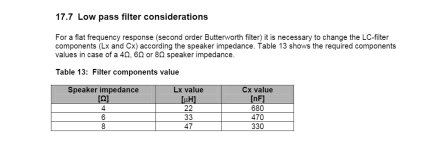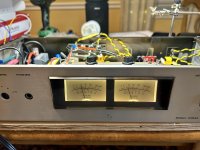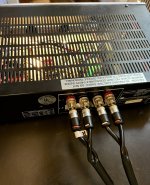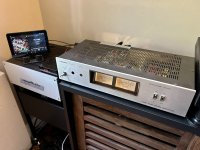Hi Richard, the second board has been released by Custom in New York. I'm sure it will be here soon.
Had the power polarity positions changed on the R6 boards? The R5 boards had the power GND on the inside toward the output connector..
Thanks, Pete
Had the power polarity positions changed on the R6 boards? The R5 boards had the power GND on the inside toward the output connector..
Thanks, Pete
Yes, the power connector has been rotated 180degrees between r5 and r6. So this puts the +24V terminal facing the output connector on r6. Since the connector itself is keyed so it can only accept its mating half one way around, any mating connector wired to suit r5 will also suit r6.
Richard, I just happened upon the Philips datasheet for the TDA8932 and noticed this low pass filter LC guide (see attached photo). Did you ever try the 47uH & 0.33uF combo on your amps? I'm asking because my speakers are rated at 8 ohms (nominal). My experience with altering the LC output filter on most 3255-based Class D amps led me to the opinion that it doesn't seem to change what one hears very much between setting the filter up for 4 ohm vs 8 ohm speakers...your thoughts?
Thanks,
Pete
Thanks,
Pete
Attachments
Hi Pete,
I wonder what edition of the DS you have there. I have rev04 and the table of filter component values looks like this :

Seeing as the design is BTL, 8ohm load corresponds to 22uH/680nF. I guess your excerpt is for SE operation. I haven't tried using 47uH/330nF, no.
Running a lower impedance than the one designed for tends to produce HF roll-off. But its not subjectively very noticeable as it really only takes much effect above 10kHz.
I wonder what edition of the DS you have there. I have rev04 and the table of filter component values looks like this :
Seeing as the design is BTL, 8ohm load corresponds to 22uH/680nF. I guess your excerpt is for SE operation. I haven't tried using 47uH/330nF, no.
Running a lower impedance than the one designed for tends to produce HF roll-off. But its not subjectively very noticeable as it really only takes much effect above 10kHz.
Thanks Richard...old one; 2005 publication and their chip was only rated at 2 x 15-25W. They go over SE vs BTL throughout the document but only listed the one LC filter table. They don't designate it for SE vs BTL.
P
P
Hi Richard! I bought 2 pairs of the +11 boards, at different times (due to blowing one up in a down right plum move), the 2nd set did come with some shunts you made, they were longitudinal, thin (width), rectangular ones. I found them to give the music a slightly dry, lean feel so prefered the stock regs, until I tried the excellent Sparkos.I may have gotten this wrong but as far as I recall, @Shertzy's comparisons were between Sparkos and the original LM317 in that position. His report of an improvement was what inspired me to come up with the shunt, so I don't believe he's done that particular comparison (Sparkos vs shunt).
Hi Pete, I used 21.5v Sparkos regs, as per the circuit specs, could using different voltage specs effect the end result? Absolutely.Thanks dubai2000...I'm going to try the ACA power supply filter by rhthatcher between my single Mean Well LRS-150-24 PS and the amp boards to see if that adds anything. I'm using Richards shunts boards instead of the stock regulator called for in the schematic btw.
I did try Sparkos regulators (18V) in the U3 position and I did hear a bit of a musicality difference than with the shunt but not so much better that I would tell folks to spend the nearly $100USD although Shertzy did say that he thought the improvement was quite noticeable. I'm 66 so maybe my ears just can't detect the subtle changes in the upper frequencies.
Cheers, Pete
I think you mentioned that the guy from Sparkos told you to get under spec'ed regs and run them hot, was that it? Might have missed the point but these are feeding 18v output, instead of 21.5v, so there's nothing running hot, rather slightly starving the next stage? Anywho, glad you enjoying tinkering.
I was also using twin LPS supplies from the start, not sure if that would improve the judgement at all.
Some stellar steampunk design! Looking forward to the next stages of design and testing.Speaking of improvements to higher freqs, I now have a prototype which does sound a bit clearer than monoAMP. Trouble is, its way too 'hair shirt' to turn into a kit at present. There are 12 * AD815 ADSL drivers soldered to this double-sided PCB, 6 in parallel per channel....
View attachment 1164011
The nice thing about having the power rails on either side of a DS PCB is - its very easy to go crazy on adding caps around the edge.
Nice weekend to all!
Jules
First power up of my new MonoAmps is a success! I replaced the previous TPA3255 board with integrated power supply I had in this chassis with the MonoAmps.
This build uses an inexpensive 24VDC SMPS plus a P089ZB filter per channel.
I still need to sort out the meter and light connections, but this sounds fabulous with my test speakers so far.
Thanks for the great design and service, Richard! I’m a happy camper with these modules!
This build uses an inexpensive 24VDC SMPS plus a P089ZB filter per channel.
I still need to sort out the meter and light connections, but this sounds fabulous with my test speakers so far.
Thanks for the great design and service, Richard! I’m a happy camper with these modules!
Attachments
Just for information sharing sake I've reported, in the other forum thread (https://www.diyaudio.com/community/...d-tda8932-25w-8r-mono-amp-kits.359193/page-18), that the use of Richard's newer "IR" shunts really made a positive sonic impact as compared to either his original shunts or the use of Sparkos regulators at U3. I've never tried the original regulators sold with the kits. IMHO they are a positive upgrade to this wonderful little amp kit.
Cheers,
Pete
Cheers,
Pete
I can confirm the amp sounds VERY good in my main system. It is certainty a contender for the top warm weather amp.
Please excuse my technical ignorance: I have a pair of boards set to 2v. I would like to use them in a system with too much gain. Would adding a potentiometer to the inputs work to reduce the input enough?
Adding a pot to reduce the input level will work though its not ideal. Increasing the driving impedance at the trafo input is going to increase distortion so keep the pot value as low as you can.
I added some better binding posts to my MonoAmp and have it playing in the main system again. Sounds great!
Thanks again, @abraxalito!
Thanks again, @abraxalito!
Attachments
- Home
- Amplifiers
- Class D
- Transformer input TDA8932 mono amp





